Introduction
It is crucial for entrepreneurs to grasp the details of business valuation expenses in order to enhance the worth of their company effectively.Many factors like the business size and intricacy the reason, for valuation the techniques used and the industry specific expertise needed are considered during this process.This thorough method not helps owners anticipate costs but also brings attention to their businesses strengths and areas for growth.
With this understanding in hand companies are equipped to maneuver the realm of business appraisal with certainty ensuring they are, in a strong position to succeed in a challenging market.
Key Factors Influencing Business Valuation Costs
When examining the expenses associated with assessing the worth of an enterprise, it's essential to consider a range of factors. 'These aspects assist owners in predicting expenditures and making strategic choices.'. The expenses associated with valuation can vary depending on factors such as the characteristics of the business the purpose for which the valuation is being conducted and the methodologies used. For instance, analyzing a software firm's position in the industry is essential for obtaining understanding of its value. A strong position in the industry often signifies an edge, which might be evidenced by a devoted customer base, unique product offerings or cutting edge technology. To truly comprehend this situation one needs to consider how much of the industry the organization possesses, where it's headed in terms of growth and how long it can sustain its advantage.
Moreover the worth of a tech firm is intricately linked to the robustness and scope of its property (IP). Intellectual property assets play a role in competitive advantage and can significantly influence investor confidence and the business's position in the industry. A thorough IP evaluation is essential. Encompassing both officially recognized rights like patents and trademarks as wells as rights such as trade secrets.. This assessment delves into the safeguards in place. The significance of IP to revenue streams.. Its harmony, with strategic objectives..
In the end. In general, understanding these assessment elements not only prepares entrepreneurs for potential costs but also highlights strengths and growth opportunities in their enterprises. An informed person stresses that 'The primary objective in commerce centers on enhancing worth and impacting every aspect of the organization.' This perspective ensures that businesses aren't solely concentrated on maximizing profits but are also eager to improve value while being ready to adapt and present concepts in a demanding economic environment.
Size and Complexity of the Business
'The scale and intricacy of an organization play a role in determining assessment costs for enterprises of various sizes; larger entities with diverse revenue sources or complex structures typically necessitate a thorough evaluation to ascertain their actual worth. This meticulous examination can result in increased assessment costs; for instance, in the tech sector where gauging market standing and competitive edge entails assessing market share, growth trends, and innovative capacities.'.
Smaller companies often have intricate arrangements which can result in decreased assessment expenses compared to larger enterprises. Take for example a mobile laundry service named The Laundry Basket. Despite facing expenses, for supplies and labor as they increased over time. They managed to maintain a straightforward operational framework that assisted in keeping their assessment costs at a low level.
Understanding the goal of a business is crucial in determining its value too. Businesses that focus on expansion and innovation rather than earnings may encounter increased assessment challenges as their potential necessitates careful review. On the hand, enterprises concentrating on consistent and foreseeable activities are likely to receive accurate appraisals, with simpler assessments.
Purpose of the Valuation
'The reason behind an assessment plays a role in determining its price since different situations call for different degrees of thoroughness and examination levels.'. For instance, assessments related to mergers and acquisitions typically involve thorough reviews such as the Quality of Earnings (QoE) analysis to verify the sustainability and accuracy of an organization's financial results. This exhaustive assessment assists buyers, investors and lenders, in making choices by scrutinizing income origins identifying possible financial hazards and evaluating the credibility of reported profits.
In disputes involving assessments, thorough documentation and clear justifications for the appraisal process are necessary. Stakeholders such as joint venture partners and key employees should have their roles clearly defined since their interests can greatly influence the final assessment amount.
"When it comes to financing needs and requirements for situations like the recent Thomas Connelly v United States legal case, it emphasized the significance of factoring in life insurance payouts when determining a business's fair market value in buy-sell contracts. This decision stresses the nature of having transparent and accurate assessments to prevent conflicts and uphold precise financial reporting.".
In terms of the purpose driving an assessment, it determines its level of intricacy and expenses involved. Prompting the need for a thoughtful strategy to address the unique requirements, in each situation.
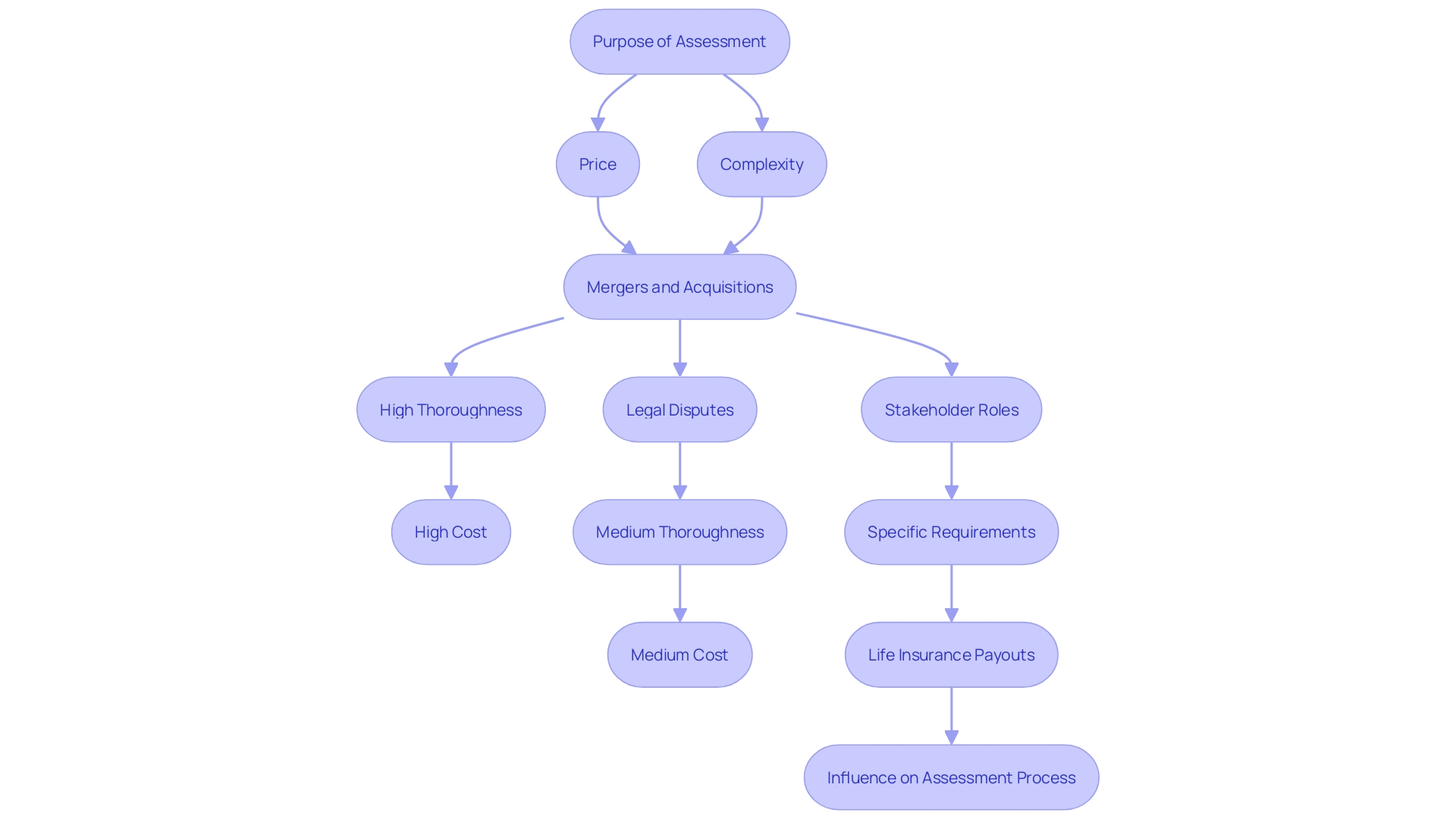
Valuation Methodology
Selecting the valuation method is essential in accurately assessing the value of a company with primary methods encompassing different approaches such, as;
The asset based approach involves evaluating a company's non material assets to determine its overall value by considering the business possessions as benchmarks for assessment purposes. For example in real estate scenarios this approach would contrast a property estimated value upon completion, with the expenses of the project to point out potential profitability margins.
When considering the 'Income Approach,' one focuses on assessing the revenue and cash flow possibilities of an enterprise in order to attract investors with its promising financial prospects. This method involves analyzing documents such as the income statement and cash flow statement to assure potential financiers of the organization's fiscal soundness. An evaluation of earnings quality is frequently pivotal, in this process as it sheds light on both the dependability and potential pitfalls linked to declared profits.
Analyzing the market approach involves looking at how a business stacks up against similar companies that have been sold recently to gain insights into its value from a market driven standpoint It's crucial for grasping a company's position in the market and its competitive edge For instance when determining the value of a software company factors, like its market share rate of expansion and how sustainable its competitive advantage is are Companies that continuously innovate and adjust to meet market needs often receive higher valuations
Grasping these approaches assists, in making informed choices regarding the worth and future prospects of a company.
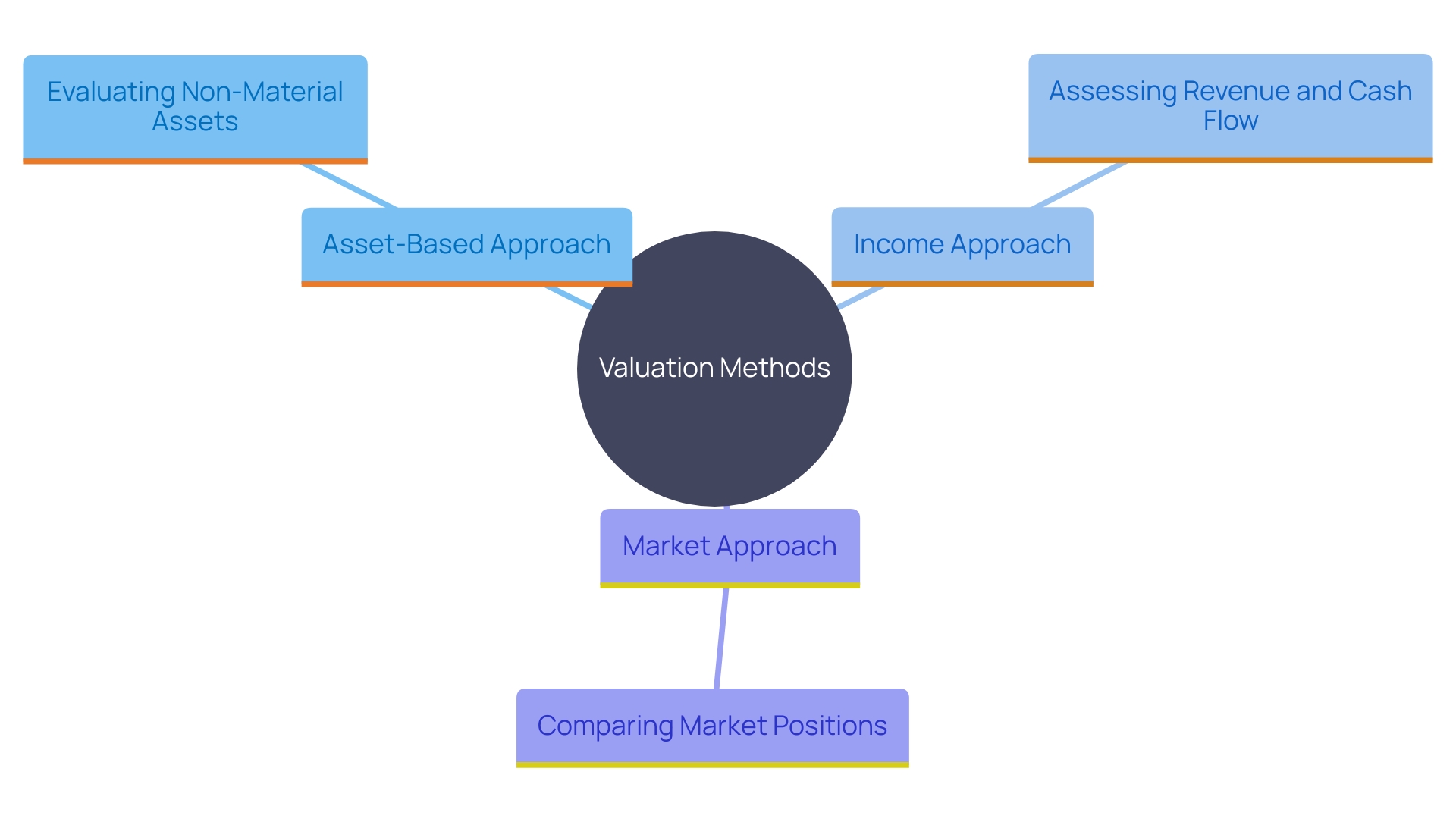
Industry and Specialized Knowledge Requirements
Valuing companies in sectors demands expert knowledge because of their distinct features and measures. For instance, in the technology sector, accurately assessing a company's position involves examining factors such as share, growth trajectory, and competitive advantage. "Companies, with a competitive position often benefit from a loyal customer base, distinctive product offerings or cutting edge technology.". Assess ing these components necessitates a grasp of industry specific trends and advancements.
When evaluating healthcare expenses it's important to take into account both intangible costs. By examining the cost of ownership. Covering not just initial purchase expenses but also maintenance fees and additional hidden costs such as staff training and operational downtime. One can conduct a thorough financial evaluation that is essential, for precise assessment and strategic planning purposes.
The manufacturing sector also faces obstacles to overcome. There has been a resurgence in American manufacturing lately due to the progress in AI and digital technologies. This emphasizes the necessity of having knowledge in these fields. Businesses that embrace the advancements of the Fourth Industrial Revolution have experienced notable expansion.This stresses the significance of keeping updated with progress, for precise evaluation purposes.
In general' having expertise in these fields is crucial, to understanding their complexities' which can greatly affect the value and results of assessments."
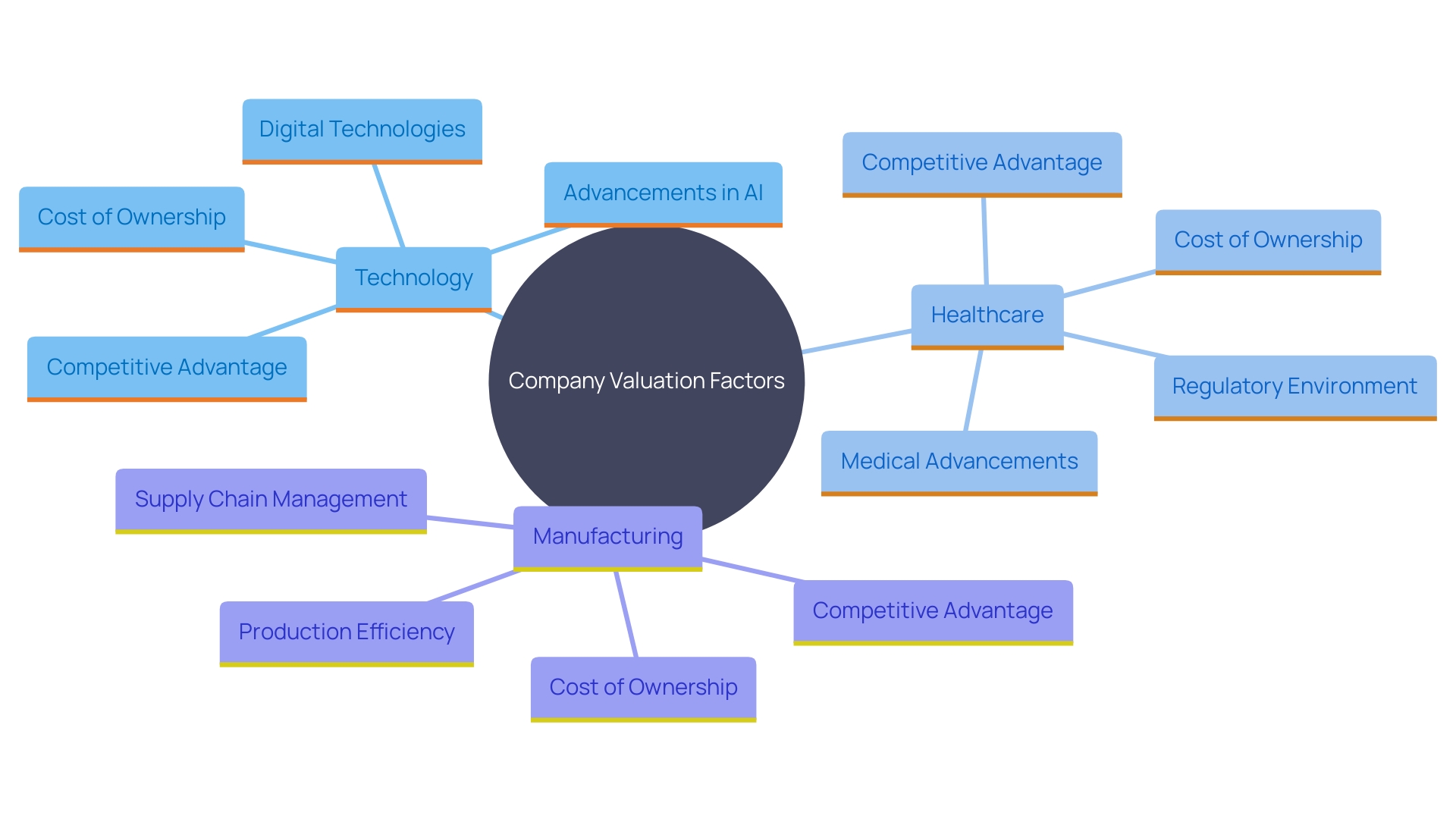
Turnaround Time and Urgency
When an organization requires a valuation assessment and the expenses can increase significantly in such scenarios because the evaluation specialists have to swiftly allocate resources and prioritize the task to ensure they evaluate it in a timely and precise manner. The urgency of the situation often leads to shifting focus from other projects or bringing in extra staff members which ends up increasing the fees charged. In sectors like technology where positioning and competitive advantage are factors, considering them when evaluating a business promptly is essential. According to professionals in the field of industry analysis evaluating how much of the market an organization holds, the path it's taking for growth and how recognizable its brand is demands examination, especially when time is limited. As a result quick assessments are possible. Will cost more because of the added work and resources needed.
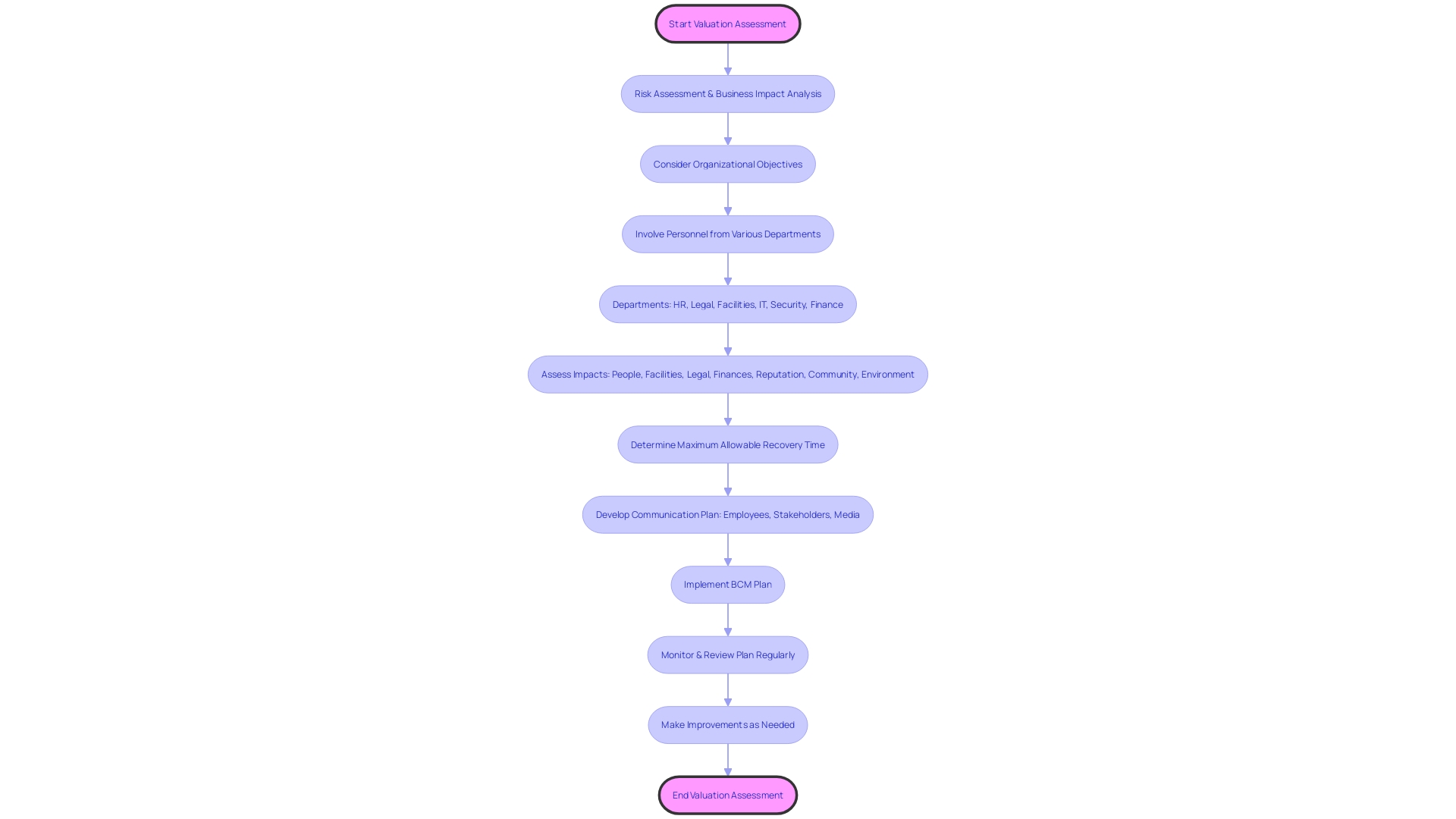
Cost Ranges for Different Business Sizes
The costs associated with assessment can vary significantly based on the size and complexity of a company.
Small enterprises typically possess worth that can fluctuate from a few thousand to tens of thousands of dollars depending on elements such as the intricacy of the business and the sector it functions in. For instance. A small technology startup might have an assessment because there is a need to carefully consider aspects, like intellectual property and competitive stance.
Mid sized firms typically face evaluation costs between $10k and $50k dollars, for an assessment of their position and competitive edge which directly affects their overall value.
Large Corporations; Major enterprises might encounter assessment costs exceeding $100k since comprehensive evaluations are needed, considering elements such as presence in the industry and brand recognition, along with innovative capabilities as criteria to gauge their value in the economic environment.
In today’s commercial environment where an organization’s worth is significantly affected by its market standing and intellectual property holdings, it is crucial for entrepreneurs to understand the complexities of assessment expenses to increase their enterprise's value.
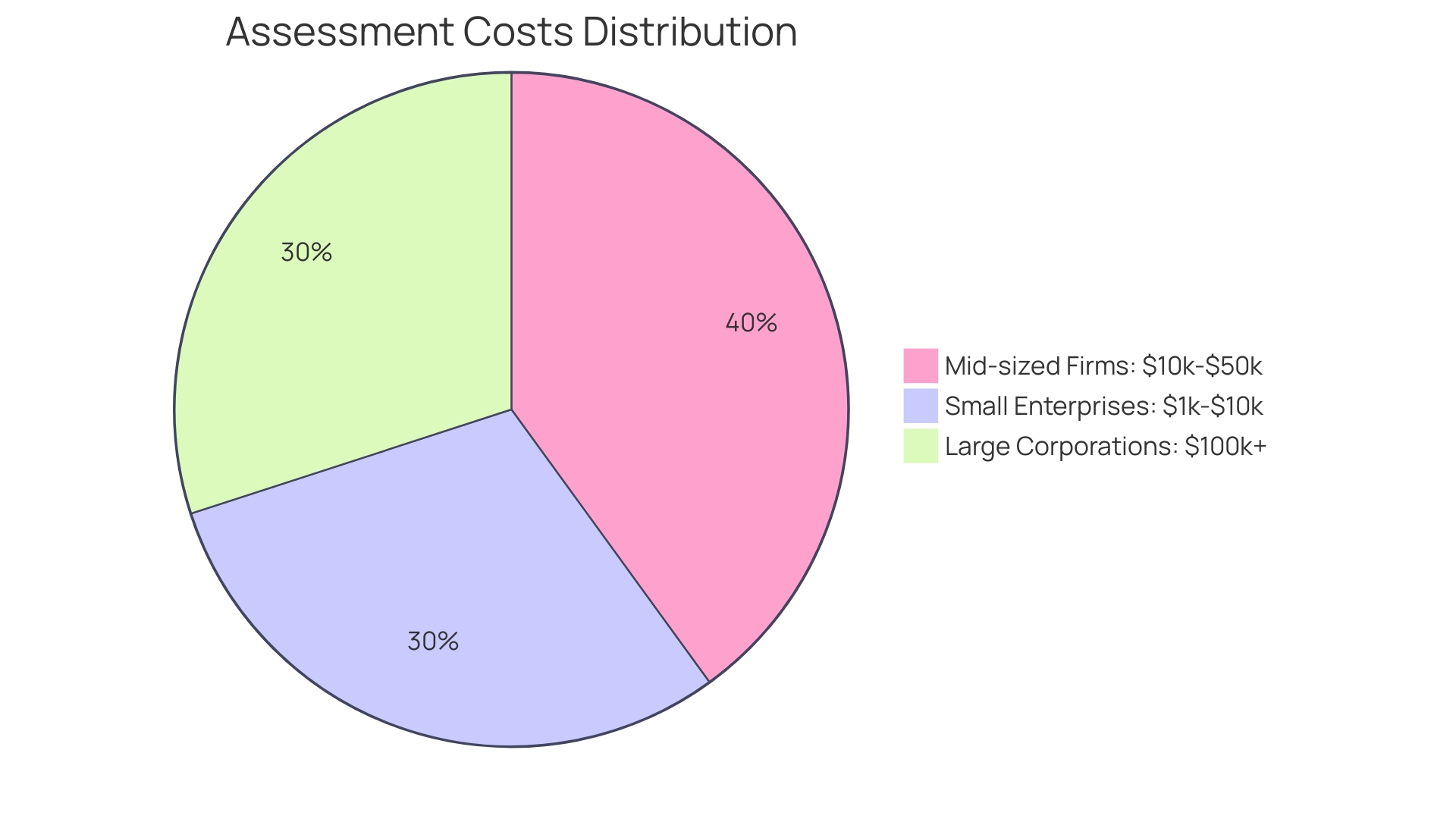
Choosing the Right Business Valuation Provider
Locating the company to manage your assessment is essential for achieving accurate and beneficial results that are most significant for your objectives and aims as a company owner or manager. Look for experts with a proven history in your field who grasp the intricate details that influence valuation figures significantly. Their knowledge and experience guarantee an accurate evaluation that plays a crucial role in establishing equitable compensation structures and ensuring adherence to tax laws. Considering industry trends alongside market conditions and growth potential enables these experts to provide an assessment that truly reflects the real worth of your enterprise. Achieving such a degree of accuracy not only helps avoid possible penalties but also provides a reliable standard, for determining equity based compensation levels which can result in improved strategic choices and business results.
Conclusion
It's crucial for business owners looking to boost their companys value to grasp the intricacies of assessing business worth and managing expenses effectively. Several factors play a role in determining these expenses like the scale and intricacy of the business operations at hand along with the valuations objective and methods utilized. Awareness of these aspects can help entrepreneurs forecast costs more accurately while pinpointing areas of strength and potential growth opportunities, within their businesses.
Valuing a company goes beyond crunching numbers—it involves an assessment that plays a key role in shaping its future trajectory. Whether analyzing a fledgling startup or an established corporation the way you approach valuation can reveal insights to guide smart choices. Opting for a valuation expert with knowledge, in your industry guarantees an appraisal that accurately captures the businesss worth leading to more informed strategic decisions.
In a market where competition's fierce and ever changing having a good grasp of valuation costs can give companies the edge to tackle obstacles with assurance. Prioritizing maximizing value, over chasing profits allows businesses to set themselves up for steady expansion and accomplishment. Taking on this valuation strategy provides entrepreneurs with the necessary resources to flourish in the current fast paced business environment.




